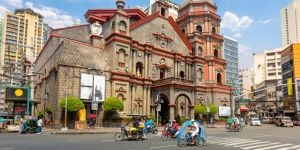Mickael writes "In the various media, inflation in the Philippines is becoming increasingly important. This is becoming a concern for some, with fears of an impact on day-to-day budgeting. Today, how does inflation in the Philippines impact on daily life? Which products and services have increased the most (insurance, shopping, petrol, electricity etc.)? Have you had to review your budget? If so, what are your priorities? What solutions have expatriates found to curb the impact of inflation? Thanks for your future contribution. Kind regards, Mickael Team Expat.com @Mickael
`
Mickael, as both Steve and the Manila Times write, there's little individuals can do regards inflation. Besides saving money.
For example ..
Manila Times, Editorial
"Long-term strategies best answer to skyrocketing inflation"
https://www.manilatimes.net/2022/06/08/ … on/1846552
ALTHOUGH the timing was entirely coincidental, it seemed grimly appropriate that the 2022 second quarter announcement of the Philippines' headline inflation, turned out to be the highest in three-and-a-half years, and came on the same day that local oil companies implemented their highest price increases in months.
And perhaps the most sobering realization in the unwelcome news about inflation is that there is no quick fix for it.
The 2nd Quarter 2022 inflation rate accelerated to 5.4 percent, according to the Philippine Statistics Authority (PSA), well above the government's target range, and the highest inflation rate since November 2018. Inflation at the beginning of this year was 3 percent.
Inflation indicators are still "trending upward," suggesting that even higher rates of inflation are in the offing in the coming months.
Unfortunately, the answer to the all-important question raised by the latest inflation figures, that being, "What can be done to lower inflation or otherwise reduce the burden on Filipino consumers?" is "not much."
For what it's worth, most of the causes of high inflation here — chief among them being food and fuel costs are largely external, and beyond the country's control.
The one exception might be high transportation costs — the transport component of the consumer price index (CPI) saw 14.6 percent inflation in May — which is partly due to poor planning on the part of the government causing a transportation shortage.
However, correcting this shortcoming will only go so far; transport costs are unavoidably affected by fuel costs, which are uncontrollable due to the Philippines being dependent on imports for most of its energy needs.
The only other easily accessible remedy to high inflation is monetary policy action by the Bangko Sentral ng Pilipinas (BSP), adjustments in interest rates and bank reserve requirements to either increase or decrease the money supply in the broader financial system.
However, there is only a relatively narrow range in which these kinds of policy adjustments can be implemented; too much intervention one way or the other can upset the economy's balance, potentially leading to a more severe economic slowdown than inflation alone might cause.
Fundamental causes
In our view, the only sustainable solutions to high inflation are those that directly address its fundamental causes — energy and food security.
In energy, the most effective way to reduce import reliance and develop the Philippines' energy independence is to redouble our efforts to adopt green energy solutions. Transitioning electricity production away from coal and especially oil- and diesel-fired power plants to renewable options will significantly reduce energy costs and price volatility.
Prioritizing the development of more mass transit, encouraging energy-neutral transportation such as biking, and loosening unnecessary restrictions that discourage the adoption of electric, hybrid or other energy-efficient vehicles will result in significant direct and indirect reductions in transportation costs.
In food production, the priority should be to adopt at least some of the many ideas and strategies that have already been developed for increasing farm productivity, diversifying Philippine agriculture, and improving agricultural supply chains.
Food security has long been a critical aspiration for the Philippines, and a multitude of concepts that can contribute to that goal have been offered throughout the years, but implementation has fallen woefully short.
Increasing the budget for the Department of Agriculture and other relevant agencies should be considered a necessary investment in the country's future, one that should have been made long ago, and must be made now.
--











